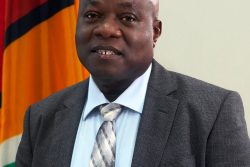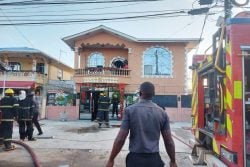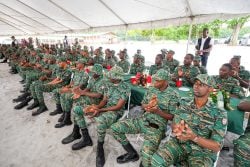The “antagonistic public discourse” amongst society in Guyana fosters a sense of division and is not helpful for democracy here, the United Kingdom’s former High Commissioner to Guyana Simon Bond believes.
In an interview with Stabroek News before his departure from Guyana last week, the diplomat said that in the three years he has been here, he has not seen a maturing of the political culture and dialogue. Bond ended his tour of duty here last month and has returned to the UK. He pointed out that he has not spent a longer time to gain a longer perspective but he has seen no great difference in the time he has been here but rather, continuity.
“There’s something about public discourse here, which I have found quite difficult to get used to and this is not just about political parties, it goes beyond that, I think even letters to the newspapers, statements by even statutory bodies. There’s a real harshness in terms of the language that people use, the vocabulary that is used and I don’t think that’s helpful either at the political level or at other levels in that it sort of creates this sense of real division and antagonism and I don’t think that works well in a democracy,” Bond said.
“Every democracy has lively debates and quite strong criticism on the political level certainly but if the starting point is always that one side are not only wrong but they have ulterior motives or something like that then I think it makes it very difficult to have a sensible discussion and debate about issues which is absolutely essential in a democracy,” he added.
While he could not say why the situation is this way, he noted that he has talked to a lot of politicians and people and there is a mix of issues that have to do to some extent with the history of the country, and the style of politics that has been employed in the past, among others.
From his perspective, Bond said, “getting away from some of this antagonistic public discourse, this way of doing politics and other things and hopefully developing a more sort of constructive way of doing things” will be an issue that Guyana will face in the future. This does not say that everyone has to agree with one another but to do it in a more constructive way so that the country as a whole benefits so that good ideas and valid criticisms are taken on board and used for the common good, Bond noted.
Meantime, in terms of attracting investment, the diplomat said Guyana probably has to try to sell itself better. He expressed the view that UK private sector companies have probably ignored Guyana for too long. Bond said he is sure that there will be opportunities here in the future and the High Commission here will work hard to make more of those opportunities. Natural resources are going to be one of the main focuses, he said pointing out that there is some UK interest in gold mining and oil exploration.
Diversification is a sensible direction to be going in, Bond said. He noted that the world is competitive and Guyana probably has to promote itself better but also ensure that there is an investor friendly environment here. As Guyana moves into the middle income bracket of countries, clear attention will need to be paid in areas like tax arrangements and electricity supplies to make sure Guyana can benefit as much as possible from international trade and investment, he said.
Bond said the country should be looking for more foreign investment but moreso a better quality of investment that would benefit the country. There are a lot of issues that needs to be addressed as well as transparency with regards to the opportunities, he stated. Most foreign investors want a certain level of confidence in what they are doing, the returns as well as the environment in which they are working, he noted.
With regard to the high migration rates of Guyana’s tertiary graduates, Bond said it is a big issue and he is surprised that it does not generate more public debate. Remittances are useful for individuals but the losses to the country of having its “best people” leaving far outweigh the financial remittances that are coming in, he said adding that it is an issue that the country should be looking at. “It’s not a party political issue it’s a national interest issue and I think it would be good to see a debate about that, how migration flow can be slowed,” said Bond. While migration is natural in modern world, “it’s clearly too one way here at the moment,” he said stressing that education is absolutely crucial to the future of any country in the global economy. Why people are leaving is an issue that should be examined in depth, he said noting that some countries are worse off than Guyana yet have less migration.
The UK’s bilateral assistance to Guyana has reduced in recent years and the programme now is “essentially finished,” Bond said. He pointed out that Guyana is now a low middle-income country and the UK concentrates development assistance on the poorest countries. The diplomat also noted that they have moved to a different approach with regards to funding and in the Caribbean; there is the Regional Development Programme from which Guyana is benefiting. The regional programme is funded with around 75 million pounds and Guyana benefits in terms of climate change funding and private sector development.
In addition, Bond said, a lot of UK assistance no longer has a UK label on it. In this regard, he cited the Caribbean Development Bank’s implementation of the UK’s aid for trade programme and pointed out that there is a couple of project in Guyana that is being funded through this. Globally, the UK is focusing more and more on providing funding through the multilateral institutions, Bond noted. He said that even with the global financial situation, aid to the region and globally has not been reduced but has increased. It is one of few areas in UK where government spending is going up instead of down and the UK is likely in the next two years to become the first major developed country to achieve the UN’s target of 0.7% of gross national income for development funding, Bond said adding that this should be achieved in 2013.
Meantime, questioned on the recent release of MI5 secret files which showed the UK’s involvement in the removal of the Cheddi Jagan government in 1953, Bond said this is a part of Guyana’s history that Guyanese can look at and comment on and look for how much significance these events have. “All I can say is that clearly, there were some, in hindsight, regrettable events that happened during that period,” he said adding that the world was a very different place then with the cold war environment being all pervasive and Britain was a different place.
The diplomat said he has enjoyed his stay here though it has had its ups and downs. Bond said that he particularly enjoyed the past year when he was appointed High Commissioner and had access to people at the political level and beyond. Noting that politics has always interested him, he said the high point was the interaction with the people while he also did some travelling. He has returned to London where he will be based in the immediate future.




